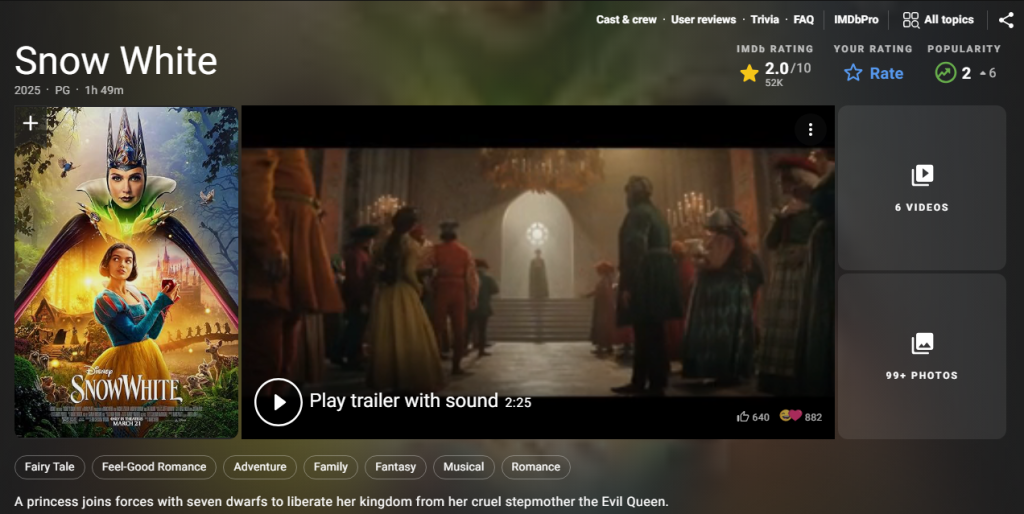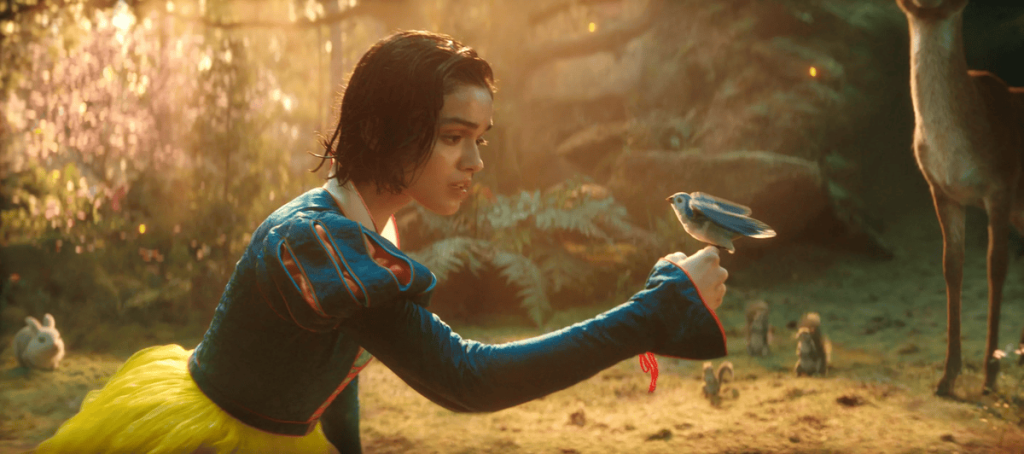Disney’s highly anticipated live-action remake of the beloved classic has become the talk of the town – and not for the reasons the studio had hoped. Despite star power and a storied heritage, Disney Snow White has faced a turbulent debut. With an opening weekend that failed to meet expectations, many are now asking: “Why did Snow White flop?”
A Dwarf Box Office Performance
Released on March 21, 2025, Snow White managed a domestic opening of only $43 million and a global total of approximately $87.3 million. This performance is particularly alarming given the film’s hefty production budget of over $250 million. Industry analysts had projected earnings in the range of $48–$58 million for the opening weekend, yet the film lagged behind, making it one of Disney’s lowest-earning live-action remakes. Comparisons to previous successful remakes like The Little Mermaid and Captain America: Brave New World have only amplified concerns over its disappointing box office performance.
With a gap between expectations and actual earnings, the film’s box office performance has become a cautionary tale about overhyped remakes in a changing market.
Controversies Clouding the Remake
From its announcement in 2016, the remake has been beset by controversy. Casting Rachel Zegler as Snow White sparked an immediate backlash from right-wing critics, who were quick to accuse Disney of “wokeness” for selecting an actress of mixed (Colombian and Polish) descent to portray a character historically noted for her “skin as white as snow.” Zegler’s own candid remarks about the original 1937 film—describing it as “extremely dated”—further fueled the debate.

Adding to the storm was the casting of Gal Gadot as the Evil Queen. Gadot’s political stances, particularly her support for Israel, clashed with Zegler’s pro-Palestinian comments, igniting heated exchanges across social media. The controversy extended to the portrayal of the seven dwarfs. Instead of using live actors, Disney opted for CGI versions, a decision that drew criticism from figures like Peter Dinklage, who condemned the reimagining as “backwards.”
These off-screen issues not only diverted media attention but likely contributed to hesitant ticket sales, as some potential viewers decided to sit out the controversy rather than engage with a film mired in political and cultural debate.
Snow White IMDb Rating and Mixed Critical Reception
Critically, Snow White has received a mixed reception. While some reviewers, including Variety’s Katcy Stephan, praised Zegler’s performance as a “shining supernova” who brings a refreshing depth to the character, others found the film’s narrative cluttered and its tone muddled. The Guardian, in particular, was harsh—labeling the film “exhaustingly awful”—while American critics provided a more tempered assessment, acknowledging moments of magic even amidst its flaws.

A major talking point has been Snow White IMDb rating. Early user scores on IMDb plummeted to a dismal 2.0/10, prompting the platform to hide the rating due to suspected review bombing. This drastic rating contrasts sharply with more moderate audience scores from CinemaScore (a “B+”), suggesting that the polarized online backlash might not fully represent the broader viewer experience.
So, Why Did Snow White Flop?
Multiple factors appear to have contributed to Snow White’s underwhelming performance:
- Controversial Casting and Remarks: The backlash over Rachel Zegler’s casting and her public criticisms of the original film alienated a segment of traditional Disney fans.
- Political and Social Clashes: The conflicting political views of the film’s leads and the resulting social media uproar likely dampened enthusiasm.
- Creative Choices: Decisions like employing CGI for the seven dwarfs instead of casting actors with dwarfism have been widely criticized, further tarnishing the film’s reception.
- Marketing Missteps: A delayed ticket sale window and a scaled-back premiere suggest that Disney sensed bad vibes, potentially impacting overall audience turnout.
Ultimately, the film’s legacy may be defined not by its nostalgic ties to a golden era of animation, but by its struggle to reconcile with the “modern audience” sensibilities with a storied fairy tale tradition.


